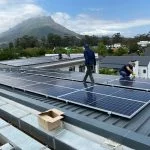A comfortable stranglehold
Everyone knows the consequences of continuing to use fossil fuels. To keep this article manageable, I suggest you watch ‘David Attenborough: A Life on Our Planet‘. We are currently in the final minutes of the fight against fossil fuels. This war was waged more than 40 years ago at the end of the 70’s. Back then, even fossil fuel giants like Exxon and Shell warned the world about the disastrous consequences of large-scale CO2 emissions at the end of the 1970s.
In the 1990s, Shell and Exxon stopped providing information about climate change. This was replaced by campaigns in which the role of mankind in climate change was questioned (for more about Shell’s role in the energy transition, see ShellWatch). This, combined with large-scale lobbying that caused increased energy consumption and stifled climate legislation, is why our economy is entangled in a comfortable, but deadly fossil fuel stranglehold.
While advancing modern society in the 1970s, few energy sources were as profitable, efficient and abundantly available as coal, gas and oil. Because of the lack of climate change research, there was no reason to explore and use alternative sources. The consequences of emissions caused by coal, gas, and oil only came to light when major investments had already been made.
The story of unclean energy and their place in the 21st century is a completely different story. The development of solar, wind, and other renewable forms of energy are going at record speed, and it seems that this revolution will continue. Still, it is not fast enough to reduce CO2 emissions to the point where we remain well below 2°C warming, as agreed in the Paris Climate Agreement. How have we not already moved past a fossil fuel driven society?
Fossil fuels on life support
Unfortunately, fossil fuel giants have unobstructed access to the meeting rooms in Brussels, giving them a chokehold on the European economy. From 2010 to 2019, the top 5 oil and gas companies and their advocates spent around € 250,000,000 on the fossil lobby in Europe. These efforts gave them front row seats at the table for essential climate policy negotiations, the ever-important European Green Deal being one of them. The result of the discussion? A tax reduction or total tax exemption for fossil fuels in the EU worth at least € 137,000,000 per year. A substantial return on investment. In fact, fossil fuels are subsidized 36 times more than renewable energy across the world.
Meanwhile – despite all the subsidies – things are not going well in the world of fossil giants. NextEra Energy, the world’s largest supplier of solar and wind energy, dethroned ExxonMobil as the largest energy supplier in the United States in early October. A historic moment indicating a transfer of power from fossil fuels to green alternatives. Shell, too, has decided to cut budgets for drilling new oil by more than 40%. These blows, coupled with the ongoing Corona Crisis, has caused demand for fossil fuels to plummet.
“Worldwide, the fossil fuel industry is subsidized 36 times more than green alternatives”
Investors are not blind to developments in the energy market. Because of the global climate energy shift, they see that money can no longer be earned when investing in a drilling platform. Therefore, they invest in technologies for sustainable generation and storage. The prices of renewable energy sources have plummeted rapidly in recent years. Solar energy, for example, has been cheaper than fossil energy sources in almost all parts of the world for years.
Beyond the Tipping Point
The so-called ‘Grid Parity point’ has been reached in recent years. Grid parity is the crucial point in which unsubsidized energy becomes a cheaper form of energy than coal, oil and gas. On paper, this seems meaningless. One could even compare it to the difference between 0 and 1 degrees. Naturally it is only 1 degree difference, but that miniscule difference causes solid ice to turn into fluid water. In this sense, it is the difference between a stagnated market, and one in which funds flow, causing near exponential growth.

In the last ten years, all around the globe, unsubsidised solar energy has become cheaper than unsubsidised fossil fuels. Resulting in a massive increase in solar panel installations
Once Grid Parity is reached, the autonomous market takes its course. The big question, “who will pay for the energy transition?” is simple to answer once you know where the money is headed. We do not want to argue for more sustainable subsidies, but rather for less money to the industry that makes our global climate and energy targets unattainable. This is how we create a ‘level playing field’ and leave the rest to the market.
We owe a lot to the fossil industry, but it’s time for this old, gray friend to enjoy its retirement. In order to get there, the financial flows and political participation of the fossil giants need to be removed. This way, the new generation of green alternatives – even without global subsidies – will have room to take over the market in a natural, unimpeded way.
Globally, governments spend 36 times more on fossil fuels than they do on renewable energy sources. Without subsidies, renewable energy sources are already cheaper than fossil energy sources worldwide. If we remove these fossil fuel subsidies, the market will do its job and investors, consumers and companies will choose the green alternative.
Do you want to learn more about solar energy or climate change? Follow us on Facebook, Linkedin and Twitter.





